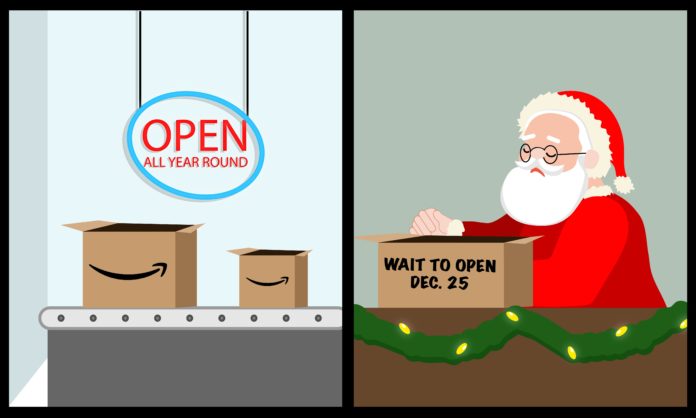For those of us who shop online, Christmas comes more than once a year. Instead of shuffling down the chimney, Santa knocks on our doors, dressed in a FedEx delivery uniform. Searching for that feeling of euphoria that comes from receiving a gift — even one you got yourself — in a brown cardboard box can be an addictive, wasteful and expensive habit.
Researchers from Beijing Normal University published a study in 2017 that linked the addictive behavior of online shopping to internet addiction and compulsive buying. That is to say, online shopping addiction has connections to not one but two other kinds of compulsive behaviors that aim to alleviate stress or negative emotions. Their research, however, found that online shopping addiction is most closely related to compulsive buying.
A 2018 NPR/Marist poll found that Amazon is the most popular source of online shopping among Americans. In fact, more than half of Americans say they’ve bought something on Amazon, and more than 40 percent say they buy something on Amazon once a month or more.
Amazon’s popularity among American shoppers likely stems from its simple two-day shipping, storing of credit card and shipping information, ability to browse for hours on end to find the best product for the best deal, and vast inventory of products from a wide variety of retailers. After all, there is little Americans value more than convenience.
However, even the convenience aspect of online shopping is brought into question when you consider the danger of not seeing an item in person until it arrives at your doorstep. This is particularly true with clothes and shoes. Though customer reviews online aim to give shoppers an accurate idea of the fit of the product, there’s always room for error. The Atlantic reported that nine out of 10 online shoppers simply don’t return items they don’t plan to use because it’s not worth the hassle. This is largely due to how cheap online goods are in the first place.
At the same time, online shopping causes an unprecedented amount of waste. While goods stocked in a traditional store are usually packaged in bulk, items purchased online are packaged individually to be sent directly to the shopper. This leads to waste from packaging. All those cardboard boxes that arrive at your door with your latest Amazon purchases have to go somewhere once the item you bought is hanging neatly in your closet. They usually end up in the landfill.
Further waste is caused by having an excess of goods. When we have access to endless streams of cheap clothing, we are more likely to find older items in our closet obsolete. While most people don’t throw away unwanted purchases, many of them try to donate unwanted goods like clothes, dishware and shoes. Although this act is done with good intentions, most of the clothes donated (at least 70 percent at Goodwill, the company told Newsweek) don’t get sold. Meaning most of them end up in the landfill though the inevitable was delayed in the process.
As fun and stress-free as online shopping is, this habit-forming practice can have disastrous results on the environment — and your wallet. A simple fix is simply to start shopping in brick and mortar stores as often as you can. It might be a bit more expensive and take a little extra time out of your day, but the process may end up saving you money in the long run. The act of driving to a store, shopping around and waiting in line gives you more time to think critically about your purchase and whether it’s worth your time and money. Since online shopping addiction by its very nature is compulsive, the easiest way to combat that impulse is to take time to think critically about your purchasing choices.
You can also try sustainable shopping, buying goods that were produced ethically or with recycled materials. Some shoppers fight shopping addictions with minimalism or capsule wardrobes, which utilize a few key fashion items that can be paired in a variety of ways while keeping your closet small. More extreme measures include going shopping-free for a year in which you only buy things you absolutely need like food or replacements for broken possessions. Online shopping can be fun and convenient, but that all comes at a cost. It’s an addiction we can each fight in the way that works best for us, our priorities and our budgets.






